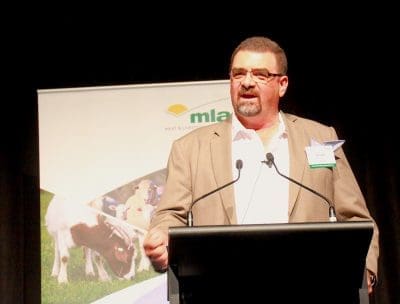
Smithfield Cattle Company CEO Jason Strong addresses the MLA Livesock Breeding and Genetics Forum in Brisbane on Wednesday.
DESPITE the Australian beef industry’s fantastic technological base and world-leading systems, the influence of genetics in the value chain still only extends about as far as breeding better bulls, leading industry executive Jason Strong told yesterday’s MLA livestock breeding and genetics forum in Brisbane.
In a frank assessment of the influence genetics currently have over Australia’s beef value chain, Mr Strong said genetic information should be playing a much more significant role in helping the industry to deliver a consistent, high quality product to its consumers.
One constraining factor was a tendency by the industry to “live in a bubble” and to create an echo chamber of discussion that was fragmented and did not have a close enough connection with the end user.
“If we have the same people with the same knowledge and the same experience trying to solve new problems, our level of confidence about solving the problem goes up, but the quality of our decision actually goes down.”
Mr Strong said that while the industry was convincing itself it was on the right track, it was still arguing over who owns industry data and where it should be stored, “before we even do anything with it”.
“Far out just solve the problem, or someone is going to do it for us,” Mr Strong told the forum.
“People are going to work out how to get this done if we don’t take the leadership and do it ourselves.”
Mr Strong, who stepped down as managing director of AA Co last year and was this week appointed CEO of Smithfield Cattle Company, described the current influence of genetics across the Australian beef value chain as “very limited”.
Industry too heavily ‘front loaded’
“We’ve done a fantastic job of developing and applying technologies in breeding better bulls, but as far as influencing the rest of the value chain with genetic information and genetic tools, we really have fallen short,” Mr Strong said.
“Once we get past making a bull breeding decision, we can’t use much of the genetic information that is there to actually make a very informed decision to change the way we run our business, such as decisions about appropriate markets or responding to changing weather conditions… which allows our cattle to perform better or maximise the value from them based on their genetics,” he said.
The world’s leading companies are now technology companies such as Facebook and Apple, which are driven by understanding what their end customers need.
Mr Strong offered examples of companies that had been in extremely good positions once but had fallen away because they had become too confident or complacent and failed to respond to changes coming at them. Home video giant Blockbuster could have bought Netflix comparatively cheaply several years ago but saw no future in live streaming and has now disappeared. Former mobile phone world leader Nokia had all the technology to make smartphones before anyone else but didn’t act, and was run over by Apple and others.
It was not all bad news – there were also plenty of examples of companies that have responded successfully to change, such as US electronics retailer Best Buy which responded proactively to the online challenge from Amazon with better designed, more convenient stores and is now stronger.
Think outside the square
If the Australian beef industry genuinely wanted to make genetic progress, it had to fundamentally think outside the square.
“One of the challenges is if we just ask the same people the same thing, then they are largely going to tell us what they know.
“How can they actually tell us something new, or something that is another opportunity, when they actually have no concept of what that might be?”
 Underlying his point that the industry had to think differently, Mr Strong pointed to the classic Henry Ford quote: “If I had asked people what they wanted, they would have said faster horses”.
Underlying his point that the industry had to think differently, Mr Strong pointed to the classic Henry Ford quote: “If I had asked people what they wanted, they would have said faster horses”.
Echo chamber
Service, convenience, information and utility (useability) will be the drivers of value in future, Mr Strong said, not who is holding the data or who had the initial sample of information.
“It is what we actually do with it, how we actually turn that information into a decision tool and a piece of technology information we can use further downstream.
“Knowing what people need, when and where they need it, so that they can make better and more timely decisions, should be one of the biggest drivers of how we think about the downstream supply chain application of genetic information.
“Because this is one of our biggest challenges.
“We create this echo chamber of discussion about what we should do and how we should do it, and if we have the same people with the same knowledge and the same experience trying to solve new problems, our level of confidence about solving the problem goes up, but the quality of our decision actually goes down.”
Genetic info needs to go ‘much, much deeper’ into supply chain
He said the industry had to find a way to capture and utilise genetic information “much, much deeper” into the supply chain than breeding and using a better bull.
“We have all of these fantastic decision making tools that MLA and the Departments of Ag have developed over the years, around pastures and weather forecasting and growth rates and managing information, but we don’t have any way to put genetic information into those because we can’t collect it and we can’t capture it.
“We need information and tools that are readily available and directly applicable to decision making downstream in the supply chain.
“How can we use that genetic information to make a better decision further downstream, how are they going to perform in a feedlot, from an efficiency point of view, from a quality point of view, health point of view, how do we capture and manage that information and utilise it more effectively downstream.”

…not sure that this approach has provided a solution or at the very least hinted at some form of much needed change. Yes, “we do need to continue thinking outside the box”, however, we need to make sure that we still have our feet on the ground! The overriding commercial imperative for producers is getting a calf on the ground each year and bull genetics plays an important part. The practical issue is that breeding cattle to perform is a long game and gradual gains are all that could be expected……..however, maybe there is a silver bullet in the form of an Apple App that MLA is secretly working towards that will resolve droughts, improve feed conversion efficiency, improve red meat yield, etc ……”just click here”. We don’t need to be dumbed down.
Come on fellas- get real. Glad I did not spend 2 days traveling to Brisbane to listen to that. I use 30 years of abattoir feedback and feedlot close outs plus bulls in the top 25% of relevant EBV’s to extract quite profitable outcomes from our supply chains. We recently closed out a pen of 128 steers that all graded with high MSA scores, converted at 4.05/1 on a DM basis, no deaths and minimal treatment costs. These cattle obviously have good genetics but more importantly did a Kg/day whole of life and are as quiet and delivered to the feedlot fully hydrated and stress free. I reckon that the industry needs to get back to basics by maximizing nutrition and good stock handling rather than pursue high tech ” silver bullets”.
This was a fantastic presentation that we also attended.
It really highlights the Genetic Echo Chambers we operate in within Australia, and unfortunately as result, as Alex Ball mentioned also, it’s the producers that are not capturing the extra benefits on farm and further down the supply chain.